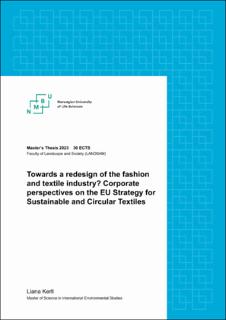| dc.description.abstract | The EU Strategy for Sustainable and Circular Textiles aims at reducing the harmful environmental impacts of the fashion and textile industry. This master thesis investigates fashion companies' experiences and views on the EU Strategy for Sustainable and Circular Textiles, with emphasis on the opportunities and challenges that companies see with regard to the future implementation of this environmental policy. Additionally, it explores how companies organize themselves to adapt to climate change as addressed in the EU Strategy. Finally, it explores whether these actions are likely to lead to greater sustainability and circularity in the fashion industry by 2030.
The study was conducted by interviewing sustainability representatives of four fashion companies operating in the European market and with a particular focus on sports and outdoor activities. Interviews provided knowledge and views on the potential scenarios and outcomes of the EU Strategy.
The findings suggest that the EU Strategy for Sustainable and Circular Textiles represents a significant step towards increased sustainability and circularity in the fashion and textile industry. However, various barriers to its implementation have to be considered by policymakers and industry professionals. The implementation of the policy has just started, with much progress and development ahead: considerable efforts, motivation, time, cooperation, and resources are required in order to achieve progress toward sustainability and a more circular economy.
Overall, this research sheds light on the potential challenges and opportunities associated with the upcoming implementation of the EU Strategy for Sustainable and Circular Textiles, offering insights into the fashion companies' journey towards sustainability and circularity. This research aspires to provide an initial assessment of relevance for policymakers, fashion companies, and consumers while paving the way for further research in the realm of the EU Strategy for Sustainable and Circular Textiles. | |
